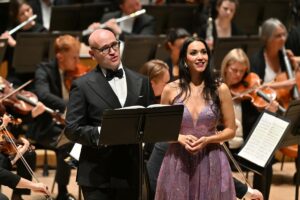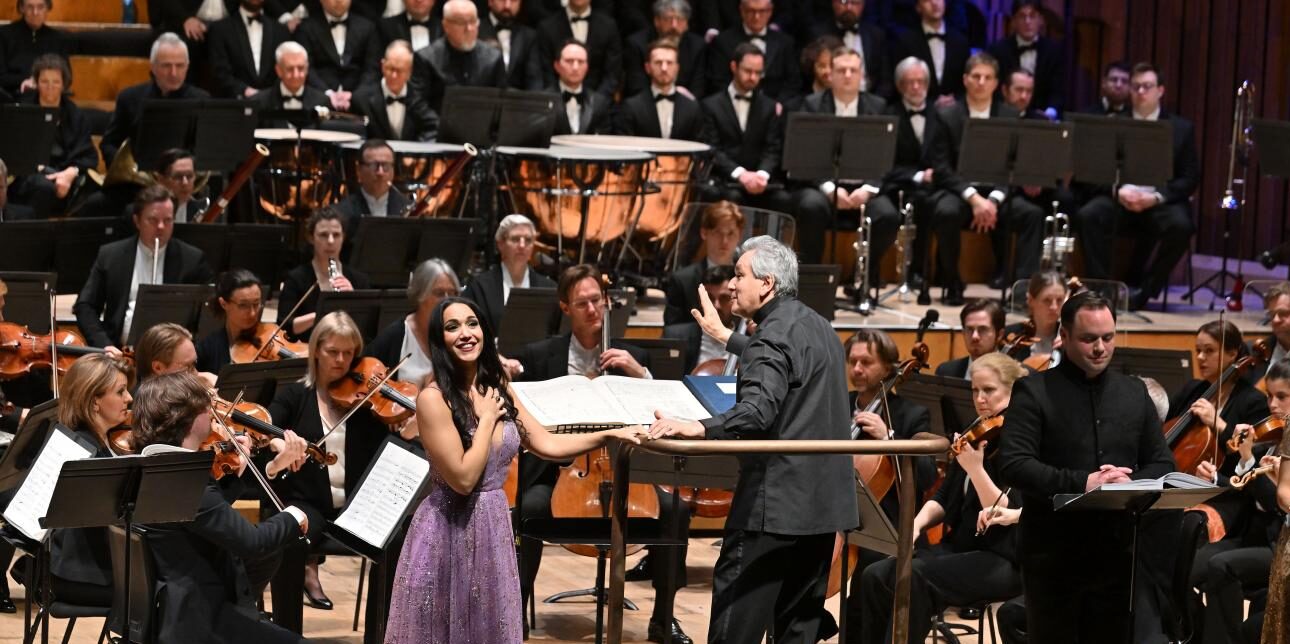As Puccini’s centenary year continues, the world has been treated to a wide array of his works, and La Rondine, though lesser-known, has enjoyed a resurgence in 2024. The Barbican was packed, an encouraging testament to the opera’s enduring appeal.
Commissioned for Vienna, La Rondine was delayed by the outbreak of World War I and premiered in neutral Monte Carlo. Ricordi, Puccini’s publisher at the time, famously dismissed it as “bad Lehàr”—a reference to the same librettists who had written for Lehàr. Despite a lukewarm reception, the opera gained popularity, particularly after a celebrated performance at the Met featuring the legendary Gigli. Though Puccini remained dissatisfied with the work, composing three versions and two different endings, La Rondine gradually secured a place in the Puccini canon.
The storyline echoes La Traviata: Magda, a courtesan in Paris, is kept by the wealthy Rambaldo. At a soirée, the poet Prunier (in love with Magda’s maid, Lisette) begins Doretta’s song, which Magda completes in the opera’s most iconic aria. She dreams of flying like a swallow, escaping her shallow life to find true love and sunshine. Ruggero, the son of Rambaldo’s friend, arrives and falls in love with Magda, who leaves Rambaldo for him, adopting the guise of Pauletta, a humble working girl.
In Act 3, after a blissful few months in Nice, Ruggero, penniless, writes to his parents, asking for money and permission to marry Pauletta. Magda, devastated, realizes the impossibility of this life. In the version presented here, the first ending is used: Magda leaves Ruggero, breaking his heart. The second ending, where Rambaldo offers Magda money to sustain her new life, and Ruggero rejects her upon discovering the truth, is more tragic but often more impactful. A third version, used by Marta Domingo in Bonn in 1997, added a final tragic touch: Magda’s death by drowning.
This performance was a concert version, which meant that it was the singers and orchestra who needed to bring the story to life through their voices and interpretations, with no sets or costumes to assist them. Despite the lack of staging, the opera was captivating.
Although Nadine Sierra, the original Magda, withdrew due to health issues, Bolivian-Albanian soprano Carolina López Moreno gave a magnificent performance. Moreno, having previously sung the role in Turin, was radiant in a glittering mauve gown and commanded the stage with her voice, acting, and presence. Notably, she was the only performer without a score in hand, which allowed her to truly embody the role. Her Act 3 performance was deeply moving, and her rendition of “Che il bel sogno di Doretta” was entrancing, showcasing her superb bel canto technique and expressive top notes. Moreno’s performance confirmed that she is a rising star in the opera world.

On the other hand, American tenor Michael Fabbiano’s performance was less successful. His voice sounded strained and tight in Act 1 during “Parigi, è la città dei desideri,” and he faltered in Act 2. Although he navigated Act 3 more comfortably, his performance still left much to be desired. Fabbiano’s acting was also a distraction; his overly physical and inappropriate gestures—such as landing a kiss on Magda—felt out of place in a concert performance. His acting lacked subtlety and was undermined by his reliance on the score.
American tenor Paul Appelby, as Prunier, had a small voice but brought charm and a sense of humor to the role, interacting well with Italian soprano Serena Gamberoni as Lisette, who delivered a spirited performance despite occasional harshness at the top.
British bass-baritone Ashley Riches was a commanding presence as Rambaldo, and Canadian soprano Sarah Dufresne, Italian mezzo Angela Schisano, and Maltese mezzo Marvic Monreal all sang their smaller roles with skill, even though Puccini wrote little for them.
Under the baton of Antonio Pappano, the orchestra, chorus, and soloists brought out the full richness of Puccini’s score. Pappano’s conducting was expressive, guiding the musicians through the work’s varied emotional landscape, and the evening concluded with thunderous applause, marking a rewarding and memorable performance.
London Symphony Orchestra
Music by Giacomo Puccini (1858-1924)
Libretto Giuseppe Adami based on libretto by Alfred Wilner and Heinz Reichert
Conducted by Sir Anthony Pappano
First performance Opéra de Monte Carlo 27 th March 1917
Photo Credit Mark Allan
Cast includes Carolina López Moreno, Michael Fabiano, Serena Gamberoni, Paul Appleby, Ashley
Riches, Sarah Dufresne Angela Schisano, Marvic Monreal
Running time 2 hours 15 minutes with one interval

